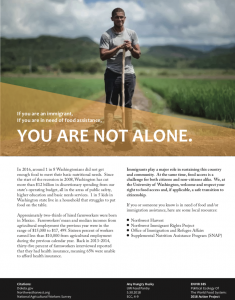I’ve always considered Immigrant rights and food security as two separate issues but after this project, I came to realize that the two are intertwined. At first, my group set out to examine food sovereignty in the US and our local UW community. We found a connection between immigrant farmworkers and their contribution to our own food supply. A report released in 2017 noted that the resilience of the US food supply is threatened by the unstable and vulnerable workforce that consists mainly of immigrants. The report on “Public Health, Immigration Reform and Food System Change” explains that “Poverty, a lack of access to health care, and a fear among undocumented workers seeking health care — due to employer retaliation or risk of deportation — are broader factors that also contribute to the underreporting of pesticide-related illness,” (Sullivan). These abuses leave farmworkers overworked and underpaid.
After learning these exploitations, my group created posters to share our information and provide resources. I was skeptical of the size of the impact these would have, but after volunteering at the UW food pantry, I met two girls named Abigail and Natalia who took a much greater interest in the information. It turns out they both come from migrant worker families and they have encountered many of the injustices we had been researching. Abigail explained that her family moved specifically from Texas so that her father could work on a farm near Bellingham. We talked about how her family was underpaid for the work they do, and that there are little benefits and no overtime pay. Furthermore, both girls had done regular seasonal farm work themselves when they weren’t at UW. And then it occurred to me that these two girls whom regularly harvest food, were coming to a food pantry to receive food assistance. This was a perverse realization and it forced me to recognize just how much they are in need of fair wages and equal rights.

Citation:
https://www.usatoday.com/story/news/politics/2017/04/04/study-undocumented-farm-workers-put-food-system-risk/100036382/

Wow! I imagine that it must have been a bitter and sunken feeling to actually see the faces of two individuals who are personally affected by the injustices which your team researched (total side-note, but I appreciate that you remembered their names)! We all have such a privileged identity students at a University, and it is easy to be surprised at the truly infinite number of experiences that our peers and ourselves actually have. Your experience reminds me that the way we eat and view food is affected by a lot more than just our dietary needs/restrictions, preferences, and even far beyond our financial situations. Our relationships with food is in many ways reflective of our relationships with our employers, with our government, with strangers and with family. This might be too grand of a question to ask, but did you or your group happen to think about potential changes that could be made regarding immigrant rights in the U.S. and how these changes would specifically influence the food industry? I find myself wrestling to land upon a satisfactory possibility, so I’m just curious. 🙂